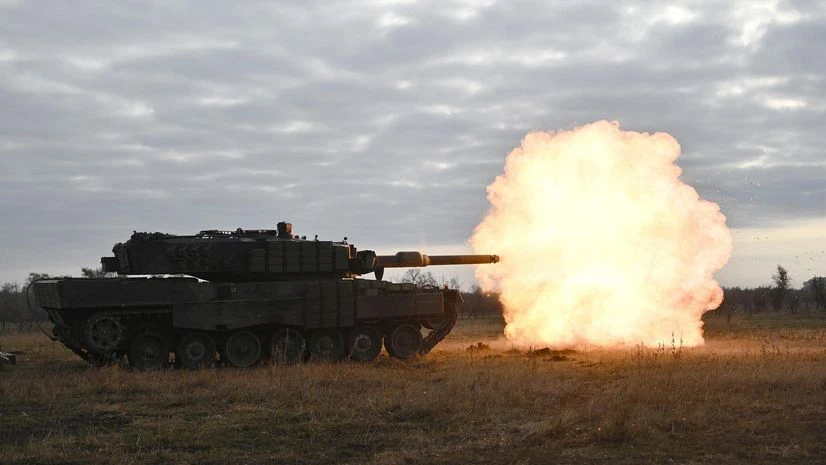By Michael Nienaber, Samy Adghirni and Alex Wickham
Joe Biden’s decision to let Ukraine hit targets inside Russia failed to galvanize broader allied support for Kyiv, in a sign of the outgoing president’s waning influence.
As soon as it emerged that Biden would allow Ukraine’s Volodymyr Zelenskiy to attack military targets in Russia using US-made long-range weapons, attention turned to Germany, France and the UK. They also have long-range missiles that Kyiv has been pleading for.
German Chancellor Olaf Scholz had moved in lockstep with Biden earlier in the conflict despite concerns about retaliation from the Kremlin. The US and Germany made a joint announcement on providing battle tanks to Kyiv in 2023 and in May agreed to permit more limited artillery attacks over the Russian border.
But Scholz made clear on Monday that Biden’s decision wasn’t enough to outweigh concerns of further escalation this time around. Looming over the decision is President-elect Donald Trump, who has signaled he’ll scale back support for Zelenskiy and shift the calculus of the war.
Also Read
“Many citizens in Germany are worried about security and peace in Europe,” Scholz told reporters on the sidelines of the Group of 20 summit in Rio de Janeiro as he explained why he still won’t send Kyiv long-range Taurus missiles. As a result, he said, he needs to “act prudently.”
After almost three years of fighting, there is a growing sense of fatigue among Ukraine’s allies — and among the Ukrainian population — as they approach another winter. Russian forces are advancing slowly and steady attacks have hobbled Ukraine’s energy infrastructure.
US National Security Advisor Jake Sullivan was asked in an interview with PBS News Hour Monday if it would have made a difference if the US provided the authorization for long-range weapons for Ukraine earlier.
“Our view has been that there’s not one weapon system that makes a difference in this battle,” Sullivan said. “It’s about manpower, and Ukraine needs to do more, in our view, to firm up its lines in terms of the number of forces it has on the front lines.”
The French and British delegations in Rio were more circumspect about their stances after Biden’s decision. Prime Minister Keir Starmer’s advisers refused to say what their policy is on the use of the British-made Storm Shadow missiles — even though he had previously indicated he was in favor of supplying some to Ukraine.
A Ukrainian official, who asked not to be identified discussing private deliberations, said it would be a massive disappointment to Zelenskiy if Starmer failed to come through on the back of Biden’s decision.
France has already sent a small number of its long-range missiles to Ukraine but officials in Rio refused to say whether Kyiv would be allowed to use them against targets in Russia, or whether more missiles would be delivered. They did though endorse the US decision.
The problem for European leaders trying to calibrate their support for Ukraine is that US policy is set to pivot dramatically as soon as Trump takes office in January. While many Republicans in Congress have vowed to keep up support for Ukraine, Trump and his incoming team have made clear they want the conflict to end.
While the Biden administration has promised to send as much support to Kyiv as possible during its final two months in office, Trump’s incoming national security adviser, Mike Waltz, brushed off the significance of the decision on deep missile strikes on Monday. He said the US focus was bringing the two sides to the negotiating table to end the fighting.
“This is a development, but it’s a tactical one,” Waltz told Fox News on Friday. “President Trump is talking grand strategy here.”
The problem with that plan is that Russian President Vladimir Putin has shown no interest in making compromises in order to halt the fighting. He may be able to call on as many as 100,000 North Korean soldiers to bolster his forces, according to analysis circulating at the G-20, and he’s likely to interpret western talk about negotiations as a sign that his strategy of attrition is working.
On Sunday and Monday, as the G-20 leaders were gathering in Rio, Putin unleashed a barrage of missiles across Ukraine. At least 21 people were killed while several power plants were seriously damaged, triggering power cuts throughout the country.
Zelenskiy has told allies that the way to force Putin to engage with talks is to give Ukrainian forces more firepower and put Russia on the back foot again.
“Russians do not understand just the negotiation,” Oleksandr Polishchuk, Ukraine’s ambassador to India, said in an interview in New Delhi on Monday. “Your negotiation should be reinforced with your military power.”
But the prospect of Trump reaching out to Putin is already shifting the incentives for Ukraine’s other allies, and triggering a scramble for influence ahead of potential peace talks.
Scholz urged Putin to engage in peace talks during a phone call on Friday. Turkey’s Recep Tayyip Erdogan has drafted a plan to freeze the conflict along the current frontlines. French President Emmanuel Macron sought out Russian Foreign Minister Sergei Lavrov and shook his hand at the G-20 on Monday.
“This war has consequences for the citizens of Ukraine. It has consequences for the soldiers defending the country, the Ukrainian soldiers. But of course it also has an incredible number of consequences for the whole world,” Scholz said. “That is why this war must come to an end, which can only happen if Russia ends its attack and withdraws its troops.”

)